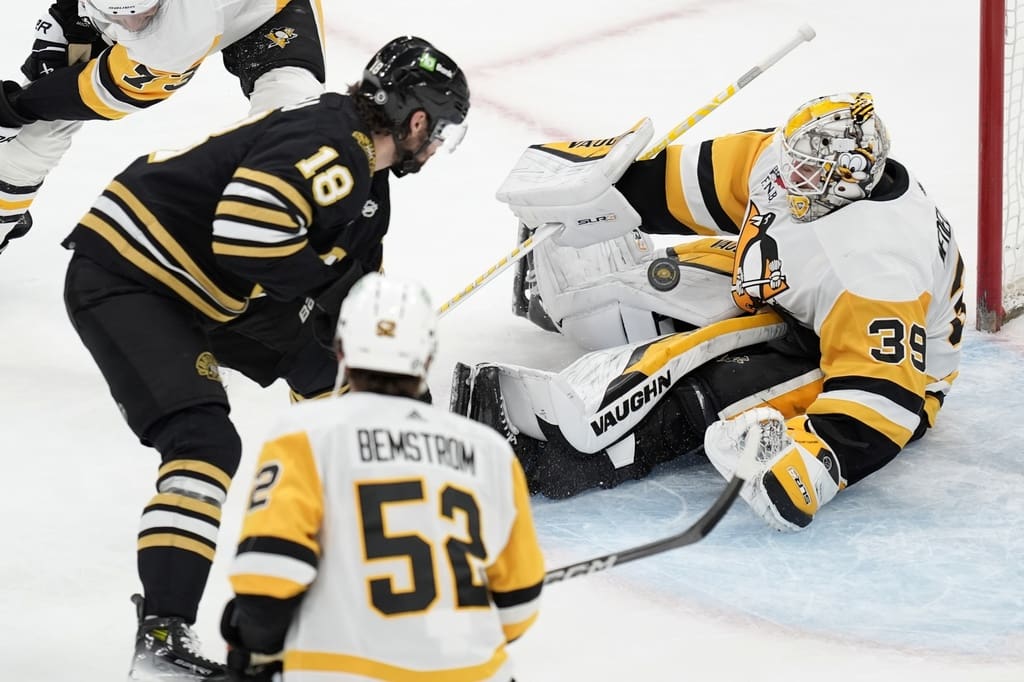Penguins
Penguins Grades: New Sad Reality on Display vs. Bruins

BOSTON — It was kind of sad, really. After some pathetic performances over the past week, which we now know was aided by the inside knowledge that Jake Guentzel was being traded and the team felt the gnawing disappointment of their GM waiving the white flag (which he wisely did), the Pittsburgh Penguins put forth some real effort Saturday.
But sometimes, the better team wins, and playing hard isn’t enough. Not even outshooting Boston 39-23 helped. The Penguins created chances in their newly formed configuration following the NHL trade deadline. Newly acquired Michael Bunting had a few scoring chances in the first period, including a short breakaway, but the Boston Bruins are one of the best in the NHL.
David Pastrnak flexed his superhuman shiftiness, and some bad luck befell the Penguins when defenseman Ryan Graves lost his stick while killing a second-period penalty, and Lars Eller hit the crossbar on a shorthanded chance. The Penguins’ opportunities met ignominious ends with Linus Ullmark in the Boston net, and Boston beat the Penguins 5-1 at TD Garden Saturday.
However, Saturday was also one of those games when the players had a much different take than those on the outside. Prepared to praise their effort and compete, the players accepted that … but admitted much more.
And in some ways, an energetic effort with indifference to the small — but crucial — details was more disheartening than getting blown out. This time, they tried. And it still was not good enough.
For a team that has been elite for nearly two decades, suddenly getting bounced by an elite team in some ways hurt more.
Lazy plays, untimely mistakes, and players who don’t seem to know better paint an ugly picture.
Penguins stalwart Kris Letang sat quietly in his locker stall, arms softly folded. His answers to easy questions were contemplative, stirring deeper questions and criticism of the team.
There was no finger-pointing, but there was a tortured acceptance of the grim realities. Even basic things they can control, like good line changes, are suddenly a heartless show of indifference that winds up in the back of their net.
“At the end of the day, the details of our game are not there right now,” said Letang. “Whether it’s changing, the system. The details of our game are not there. And when we do those details, we can win against anybody.”
The Penguins had glorious chances in the first period. Perhaps if they netted one or two of them, the rising tide would have lifted the sinking boat rather than plunging them into the icy depths.
“I definitely feel like we have opportunities to score four or five goals. We just didn’t capitalize on our chances,” said Eller. “Especially early on. We could have had one or two. When you don’t score on those, then it’s going to be hard to win, especially when you let in five.”
Bunting, who was part of the return for Guentzel on Thursday night, failed to convert on the first-period one-timer and breakaway. Perhaps that showed he would fit with this group quite nicely.
With the Penguins pressing again late in the second period, Brad Marchand and Charlie Coyle worked a brilliant give-and-go. Marchand circled behind Coyle, who took Penguins defender Marcus Pettersson towards the middle, leaving the agitating Nova Scotian Marchand alone on Penguins goalie Alex Nedeljkovic.
And in that moment, a much larger problem was exposed.
Marchand roofed a backhander. Just a beautiful play and one in which the downtrodden Penguins are no longer capable of imagining, much less executing.
Of course, setting up that three-on-two was an abysmal line change.
For the record, that was Lars Eller, Emil Bemstrom and Jesse Puljujarvi. The wingers were in a position to help the breakout but showed their numbers, not their sticks, as they coasted toward the far bench.
“We’ve got to be better late in shifts. Our line changes — one of their goals against — our forwards change and give them a three-on-two,” Sullivan said. “You know, you just simply can’t change. And if you’re tired, you simply can’t be tired. You’ve got to stay and compete, and that’s what winning hockey is about. I thought we learned that lesson the hard way.”
And both should sit out the next game for something like that. One game or 20. Imagine a Penguins coach explaining what winning hockey is.
But here we are.
Marchand’s goal put the Penguins down 3-0 at 18:25 of the second, and despite the spirited effort, it was the Bruins dagger into the Penguins heart.
Penguins Analysis
They’re simply not good enough. They just don’t have enough talent throughout the lineup. They had a few chances, but finding that extra inch against Boston mostly proved to be mostly impossible.
Also, Ullmark was seven feet tall in net. He gloved a couple of good one-timers like they were floating wristers before practice.
What the Penguins did well: Moreso in the first period than the second, they outskated Boston through the neutral zone. They had a need for the puck or the space ahead. Even Jeff Carter took the defense deep, getting a step on the outside, forcing Boston to collapse low to defend.
Yet, with one good play, they couldn’t find a second play to capitalize. Boston is ruthlessly disciplined. They yielded some good chances early in the first, but when the Penguins didn’t convert, Boston tightened the screws, and the Penguins didn’t get many great chances after the first five minutes.
One whack, not two near the net.
The Penguins also really got after the puck in the first period. They created loose pucks and turnovers with a desperate puck pressure.
Their effort didn’t wane, though it would be impossible to keep up the game from the first five minutes. Even in the third period, the Penguins’ top line created a loose puck and transitioned four-on-two when P.O Joseph jumped into the play. Joseph missed the far post.
On the next shift, Crosby won the faceoff, and Kris Letang scored with a well-placed blast from the left circle.
The Penguins just don’t have enough talent in the lineup to amplify good performances. Nor does it seem from their own comments that they possess an interest in the necessary details.
That’s a sure sign of a team quitting.
Penguins Report Card
Team: B-
We’re grading on the curve against expectations, not overall performance. The Penguins had 11 scoring chances in the first 11 minutes of the third period. Even behind, they didn’t quit.
Mistakes? Tons. John Ludvig made a couple. Erik Karlsson was forced to defend, which isn’t where you want him to be on the ice. Alex Nedeljkovic could have stopped a goal or two.
But there seems little point now in beating up Puljujarvi or Bemstrom for not doing much with great opportunities delivered by Lars Eller who played an A game. Nor is there much point in beating up the Penguins’ fourth line for not converting much despite getting six shots on goal and yielding one (stats according to NaturalStatTrick.com)
Good Performances of Note
Michael Bunting: A
Two great chances in the first period and some net-front play. Bunting moves his feet and gets after pucks. He had four shots, three hits, and three takeaways.
Evgeni Malkin
The Malkin line with Reilly Smith and Valtteri Puustinen had five scoring chances vs. three yielded and nine shots on goal vs. three allowed.
Malkin was especially good at getting after the puck.
P.O Joseph
Joseph is getting more confident joining the offensive play and he swung low a few times and joined the rush a few times with good results.
Lars Eller
OK, setting aside that awful line change Until that moment, he was playing an inspired game. He was dealing the puck like a playmaking center. He defended hard, held pucks in the offensive zone, and was a positive force, clearly playing above his normal game.
Even Eller cited the details of the game, including that line change. as the F1, he was the farthest away, yet somehow got to the bench first.
“Yeah, but (the effort) could only get better from the last game,” Eller said with a critical tone. “But I still feel like we have another level that we need to get to.
There’s a there’s some things, mistakes we make that we pay for. I think it’s some line changes and stuff like that.”
And this is why plus/minus can be misleading. Sidney Crosby was tagged with the minus as he skated hard into the play. Where everyone else was is a mystery.


